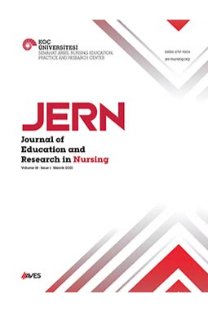Kanser Tanısı Konmuş Çocuğa Sahip Olan Ebeveynlerin Bakım Yükleri İle Anksiyete Düzeyleri Arasındaki İlişki
The Relationship Between the Care Loads and Anxiety Levels of Parents Whose Child Has Cancer
___
- 1. Steliarova-Foucher E, Colombet M, Ries LAG, et al. International incidence of childhood cancer, 2001–10: A population-based registry study. The Lancet. 2017;18(6):719-31. doi: 10.1016/S1470- 2045(17)30186-9.
- 2. Siegel RL, Miller KD, Jemal A. Cancer statistics 2018. Cancer J Clin. 2018;68(1):7-30. doi: 10.3322/caac.21442.
- 3. Al Qadire M, Al Sheikh H, Suliman M, et al. Predictors of anxiety and depression among parents of children with cancer in Jordan. Psychooncology. 2018;27(4):1344-6. doi: 10.1002/pon.4634.
- 4. Galindo-Vazquez O, Benjet C, Cruz-Nieto MH, et al. Psychometric properties of the Zarit Burden Interview in Mexican caregivers of cancer patients. Psychooncology. 2015;24(5):612-5. doi: 10.1002/pon.3686.
- 5. Kardaş Özdemir F, Akgün Şahin Z, Küçük D. Kanserli çocuğu olan annelerin bakım verme yüklerinin belirlenmesi. Yeni Tıp Dergisi. 2009;26(1):153-8. Available from: https://docplayer.biz.tr/4797344- Kanserli-cocugu-olan-annelerin-bakim-verme-yuklerinin-belirlenmesi. html
- 6. Elcigil A, Conk Z. Determining the burden of mothers with children who have cancer. Dokuz Eylül Üniversitesi Hemşirelik Yüksekokulu Elektronik Dergisi. 2010;3(4):175-81. Available from: http://hdl. handle.net/20.500.12397/4568
- 7. Klassen AF, Gulati S, Granek L, et al. Understanding the health impact of care giving: A qualitative study of immigrant parents and single parents of children with cancer. Qual Life Res. 2012;21(9):1595-605. doi: 10.1007/s11136-011-0072-8.
- 8. Chivukula U, Kota S, Nandinee D. Burden experience of caregivers of acute lymphoblastic leukemia: Impact of coping and spirituality. Indian J Palliative Care. 2018;24(2):189-95. doi: 10.4103/IJPC.IJPC_209_17.
- 9. Khanna AK, Prabhakaran A, Patel P, Ganjiwale JD, Nimbalkar SM. Social, psychological and financial burden on caregivers of children with chronic illness: A cross-sectional study. Indian J Pediatr. 2015;82(11):1006-11. doi: 10.1007/s12098-015-1762-y.
- 10. Wakefield CE, McLoone JK, Butow P, Lenthen K, Cohn RJ. Parental adjustment to the completion of their child’s cancer treatment. Pediatr Blood Cancer. 2011;56(4):524-31. doi: 10.1002/pbc.22725.
- 11. Norberg AL, Pöder U, Essen L. Early avoidance of disease- and treatment-related distress predicts post-traumatic stress in parents of children with cancer. Eur J Oncol Nurs. 2011;15(1):80-4. doi: 10.1016/j.ejon.2010.05.009.
- 12. Rahmani A, Azadi1 A, Pakpour V, Faghani S, Afsari EA. Anxiety and depression: A cross-sectional survey among parents of children with cancer. Indian J Palliat Care. 2018;24(1):82-5. Available from: https:// www.ncbi.nlm.nih.gov/pmc/articles/PMC5801636/
- 13. Shin JY, Lim JW, Shin DW et al. Underestimated caregiver burden by cancer patients and its association with quality of life, depression and anxiety among caregivers. Eur J Cancer Care (Engl). 2018;27(2):1-9. doi: 10.1111/ecc.12814.
- 14. Basher MAK, Karim MR, Sultana N, Hossain KJ, Kamal MM. Parent stress in childhood cancer. Bangladesh Medical Journal. 2012;41(1):8- 13. doi: 10.3329/bmj.v41i1.18773.
- 15. Norberg AL, Boman KK. Parent distress in childhood cancer: A comparative evaluation of posttraumatic stress symptoms, depression and anxiety. Acta Oncol. 2008;47(2):267-74. doi: 10.1080/02841860701558773.
- 16. Zarit SH, Reever KE, Bach-Peterson J. Relatives of the impaired elderly: Correlates of feelings of burden. Gerontologist. 1980;20(6):649-55. doi: 10.1093/geront/20.6.649.
- 17. İnci FH, Erdem M. Bakım verme yükü ölçeği’nin Türkçe'ye uyarlanması geçerlilik ve güvenilirliği. Atatürk Üniversitesi Hemşirelik Yüksekokulu Dergisi. 2008;11(4):85-95. Available from: http://e-dergi.atauni.edu.tr/ ataunihem/article/view/1025000688/1025000680
- 18. Beck AT, Epstein N, Brown G, Steer RA. An inventory for measuring clinical anxiety: Psychometric properties. J Consult Clin Psychol. 1988;56(6):893-7. doi: 10.1037/0022-006X.56.6.893.
- 19. Ulusoy M, Sahin NH, Erkmen H. Turkish version of the beck anxiety inventory: Psychometric properties. Journal of Cognitive Psycotherapy: An International Qarterly 1998;12(2):163-72. Available from: https:// www.researchgate.net/profile/Nesrin_Hisli_sahin/publication/233792003_Turkish_Version_of_the_Beck_Anxiety_Inventory_Psychometric_Properties/links/0912f50b89f36c598c000000/Turkish-Version-of-the-BeckAnxiety-Inventory-Psychometric-Properties.pdf
- 20. Creswell PD, Wisk EL, Litzelman K, Allchin A, Witt WP. Parental depressive symptoms and childhood cancer: The importance of financial difficulties. Support Care Cancer. 2014;22(2):503-11. doi: 10.1007/ s00520-013-2003-4.
- 21. Kavradım Turan S, Özer Canlı Z. Kanser tanısı alan hastalarda umut. Psikiyatride Güncel Yaklaşımlar. 2014;6(2):154-64. doi: 10.5455/ cap.20130901084242.
- 22. Patiño-Fernández AM, Pai AL, Alderfer M, Hwang WT, Reilly A, Kazak AE. Acute stress in parents of children newly diagnosed with cancer. Pediatr Blood Cancer. 2008;50(2):289-92. doi: 10.1002/pbc.21262.
- 23. Han HR. Korean mothers' psychosocial adjustment to their children's cancer. J Adv Nurs. 2003;44(5):499-506. doi: 10.1046/j.0309-2402.2003.02833.x.
- 24. Malpert AV, Kimberg C, Luxton J, Mullins LL, Pui CH, Hudson MM, et al. Emotional distress in parents of long-term survivors of childhood acute lymphoblastic leukemia. Psychooncology. 2015;24(9):1116-23. doi: 10.1002/pon.3732.
- 25. Wang J, Shen N, Zhang X, Shen M, Xie A, Howell D, et al. Care burden and its predictive factors in parents of newly diagnosed children with acute lymphoblastic leukemia in academic hospitals in China. Support Care Cancer. 2017;25(12):3703-13. doi: 10.1007/s00520-017-3796-3.
- ISSN: 2618-5741
- Yayın Aralığı: Yılda 4 Sayı
- Başlangıç: 2004
- Yayıncı: Koç Üniversitesi HYO Semahat Arsel Hemşirelik Eğitim ve Araştırma Merkezi (SANERC)
Şiddete Maruz Kalan Kadınlara Yönelik Güçlendirme Programı ve Hemşirelik
Kronik Obstrüktif Akciğer Hastalığında Olgu Analizi
Cerrahi Alan İnfeksiyonlarını Azaltmada Antimikrobiyal Medikal Tekstil Ürünlerinin Etkisi
Hemşirelik Öğrencilerinde Öz Yeterlik Düzeyinin Eğitim Stresi Üzerine Etkisi
Multipl Sklerozlu Bir Olguda Neuman Sistemler Modeli’nin Uygulanması
Esin SEVGİ DOĞAN, ÖZDEN DEDELİ ÇAYDAM
Selvinaz ALBAYRAK, Lale Ayşegül BÜYÜKGÖNENÇ
Akran Eğitiminin Hemşirelik Becerilerinin Öğretimine Etkisi
Deniz ÖZTÜRK, Zehra GÖÇMEN BAYKARA
Hemşirelerin Hasta Mahremiyetini Koruma ve Sürdürme Durumları ile Etkileyen Faktörler
GÜL GÜNEŞ AKTAN, İSMET EŞER, Elem KOCAÇAL GÜLER
Hemşirelerin Çocuk Sevme Düzeyleri ve Terapötik Oyunu Kullanma Durumları
